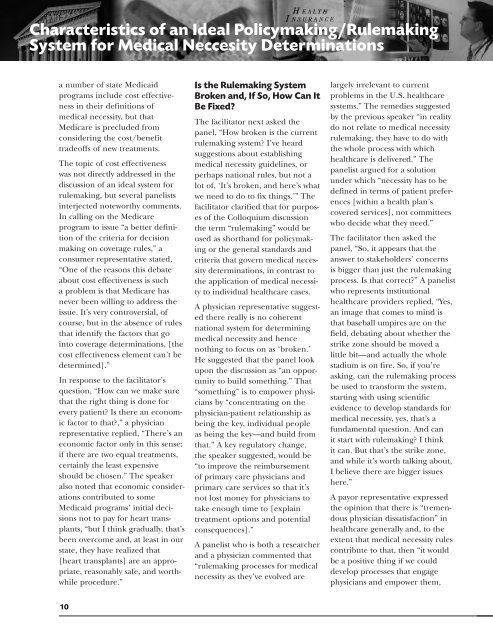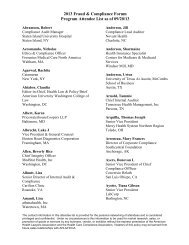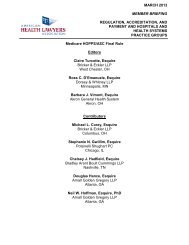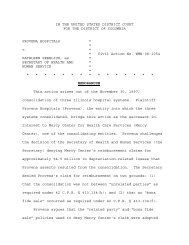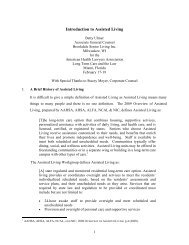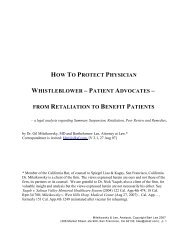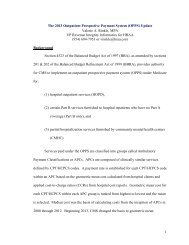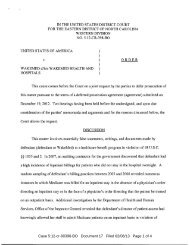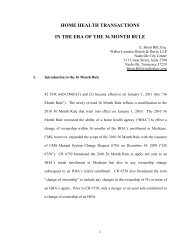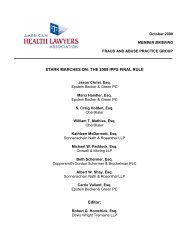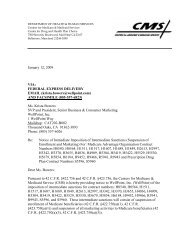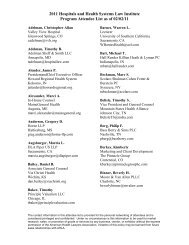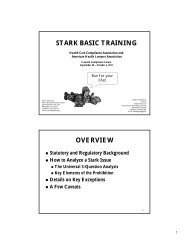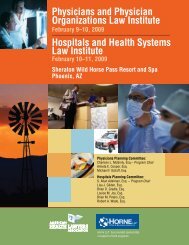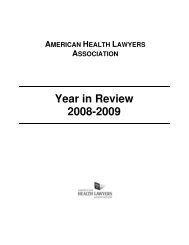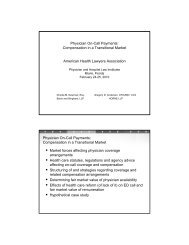Medical Necessity - American Health Lawyers Association
Medical Necessity - American Health Lawyers Association
Medical Necessity - American Health Lawyers Association
You also want an ePaper? Increase the reach of your titles
YUMPU automatically turns print PDFs into web optimized ePapers that Google loves.
Characteristics of an Ideal Policymaking/Rulemaking<br />
System for <strong>Medical</strong> Neccesity Determinations<br />
a number of state Medicaid<br />
programs include cost effectiveness<br />
in their definitions of<br />
medical necessity, but that<br />
Medicare is precluded from<br />
considering the cost/benefit<br />
tradeoffs of new treatments.<br />
The topic of cost effectiveness<br />
was not directly addressed in the<br />
discussion of an ideal system for<br />
rulemaking, but several panelists<br />
interjected noteworthy comments.<br />
In calling on the Medicare<br />
program to issue “a better definition<br />
of the criteria for decision<br />
making on coverage rules,” a<br />
consumer representative stated,<br />
“One of the reasons this debate<br />
about cost effectiveness is such<br />
a problem is that Medicare has<br />
never been willing to address the<br />
issue. It’s very controversial, of<br />
course, but in the absence of rules<br />
that identify the factors that go<br />
into coverage determinations, [the<br />
cost effectiveness element can’t be<br />
determined].”<br />
In response to the facilitator’s<br />
question, “How can we make sure<br />
that the right thing is done for<br />
every patient? Is there an economic<br />
factor to that?,” a physician<br />
representative replied, “There’s an<br />
economic factor only in this sense:<br />
if there are two equal treatments,<br />
certainly the least expensive<br />
should be chosen.” The speaker<br />
also noted that economic considerations<br />
contributed to some<br />
Medicaid programs’ initial decisions<br />
not to pay for heart transplants,<br />
“but I think gradually, that’s<br />
been overcome and, at least in our<br />
state, they have realized that<br />
[heart transplants] are an appropriate,<br />
reasonably safe, and worthwhile<br />
procedure.”<br />
Is the Rulemaking System<br />
Broken and, If So, How Can It<br />
Be Fixed?<br />
The facilitator next asked the<br />
panel, “How broken is the current<br />
rulemaking system? I’ve heard<br />
suggestions about establishing<br />
medical necessity guidelines, or<br />
perhaps national rules, but not a<br />
lot of, ‘It’s broken, and here’s what<br />
we need to do to fix things.’” The<br />
facilitator clarified that for purposes<br />
of the Colloquium discussion<br />
the term “rulemaking” would be<br />
used as shorthand for policymaking<br />
or the general standards and<br />
criteria that govern medical necessity<br />
determinations, in contrast to<br />
the application of medical necessity<br />
to individual healthcare cases.<br />
A physician representative suggested<br />
there really is no coherent<br />
national system for determining<br />
medical necessity and hence<br />
nothing to focus on as ‘broken.’<br />
He suggested that the panel look<br />
upon the discussion as “an opportunity<br />
to build something.” That<br />
“something” is to empower physicians<br />
by “concentrating on the<br />
physician-patient relationship as<br />
being the key, individual people<br />
as being the key—and build from<br />
that.” A key regulatory change,<br />
the speaker suggested, would be<br />
“to improve the reimbursement<br />
of primary care physicians and<br />
primary care services so that it’s<br />
not lost money for physicians to<br />
take enough time to [explain<br />
treatment options and potential<br />
consequences].”<br />
A panelist who is both a researcher<br />
and a physician commented that<br />
“rulemaking processes for medical<br />
necessity as they’ve evolved are<br />
largely irrelevant to current<br />
problems in the U.S. healthcare<br />
systems.” The remedies suggested<br />
by the previous speaker “in reality<br />
do not relate to medical necessity<br />
rulemaking, they have to do with<br />
the whole process with which<br />
healthcare is delivered.” The<br />
panelist argued for a solution<br />
under which “necessity has to be<br />
defined in terms of patient preferences<br />
[within a health plan’s<br />
covered services], not committees<br />
who decide what they need.”<br />
The facilitator then asked the<br />
panel, “So, it appears that the<br />
answer to stakeholders’ concerns<br />
is bigger than just the rulemaking<br />
process. Is that correct?” A panelist<br />
who represents institutional<br />
healthcare providers replied, “Yes,<br />
an image that comes to mind is<br />
that baseball umpires are on the<br />
field, debating about whether the<br />
strike zone should be moved a<br />
little bit—and actually the whole<br />
stadium is on fire. So, if you’re<br />
asking, can the rulemaking process<br />
be used to transform the system,<br />
starting with using scientific<br />
evidence to develop standards for<br />
medical necessity, yes, that’s a<br />
fundamental question. And can<br />
it start with rulemaking? I think<br />
it can. But that’s the strike zone,<br />
and while it’s worth talking about,<br />
I believe there are bigger issues<br />
here.”<br />
A payor representative expressed<br />
the opinion that there is “tremendous<br />
physician dissatisfaction” in<br />
healthcare generally and, to the<br />
extent that medical necessity rules<br />
contribute to that, then “it would<br />
be a positive thing if we could<br />
develop processes that engage<br />
physicians and empower them,<br />
10


